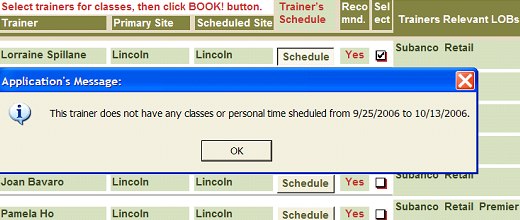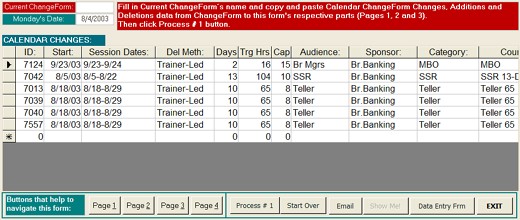Website sections:
Current section's content:
- Overview of IT Project Management
- Leadership, Management and Development: Theory
- Leadership, Management and Development: Personal Experience
- Who Should Manage IT Projects, Subject Matter Experts or IT Professionals?
- Optimization Management: Quality, Cost and Schedule
- IT Project Problem Areas
- Running IT Projects Like Small Businesses
- Working with Offshore Partners: Opportunities, Challenges, Cultural Issues











Leadership, Management and Development: Theory
Question: are the first and the second concept in the pairs listed below identical, or are they different?
- Computer application development and computer application administration.
- Real estate development and real estate management.
- Business development and business management.
- Project development and project management.
Answer: in each pair the listed concepts differ from each other.
Leadership and management are often recognized as two complementary functions. However, development is another, separate function that is important for success.
And how does this affect you personally?
This affects you personally, because whether you work or otherwise participate in team efforts somewhere, it is likely that you either have to function under somebody's leadership or management, or will be a leader or a manager yourself, or all of the above.
If the relevant roles are not identified correctly, and the needs for leadership and management are recognized, but the need for development is not recognized, problems ensue.
Leadership, management and development are not the same. They are all different. Leave any one of these three out, and you will not get successful results. Ripple effects that a failed project and unsuccessfully spent resources can cause are often widespread and may affect both people who were directly involved, and also those who were not directly involved in the project at all. Consequently, company or organizational well-being and many people's careers are adversely affected.
Qualities make sense in comparison. Identifying how leadership, management and development differ can help to define project developer's role, to pick participants for projects and to increase the likelihood that projects will be successful.
Differences
- Leadership provides the objectives and the path to achieving the objectives, and should empower people.
- Leader works on where we want to be and how we will get there.
- Management focuses on implementation, and on controlling, arranging and directing resource and expenditure usage.
- Manager works on what's happening now.
- Development moves the project toward reaching a satisfactory outcome.
- Project developer definition: Project developer handles tasks that focus on moving the project along toward a successful completion.
- Project developer works on connecting now with what should happen next, toward reaching the project's objectives.
Overlaps and Differences
Development has to do with motion toward an outcome. Accordingly, developer has to understand the inner dynamics of the project, the objectives and how to reach them. Here is an overlap with leadership. However, developer may not have the authority to establish project's objectives and the path to achieving the objectives the way leader does. Leader may not necessarily work on implementation the way developer does.
Both manager and developer work on implementation. However, developer may not have the authority to control and direct resources the way manager does. Manager, even when he or she is project participant, may not actually work on moving the project along toward a successful completion.
Selecting People and Skills
It is important to make sure that leadership, management and development roles and skills are all represented among project participants, and the participants are willing and able to use the needed skills.
- Leave leadership out, and you will get projects that may start out with enthusiasm, but soon lose their fire.
- Leave proper management out, and you will get a lack of resources or mismanagement of resources.
- Leave development out, and you will get stalled projects that are not going anywhere.
It is not enough to have two out of three types of skills represented. For example, managerial skills may be represented and necessary resources may be allocated and used. Leadership may also be represented and people may get together enthusiastically. Yet, nothing noteworthy is being achieved if project development is not being handled as needed.
Similarly, if only project development skills are represented without the necessary authority that leadership and management members have, you get projects that show strong potential, but cannot materialize it.
Similarly, if only leadership or managerial skills are represented without the support of the other skill areas, necessary results are not being achieved effectively as needed.
Best solutions can be found by making sure that the necessary roles and skill areas are represented, and by allowing people who have the needed skills to use them.
A single person can be both leader, manager and developer. However, in reality, many jobs require that people specialize on certain tasks and when they do, and especially when they are good at something, they may not have enough time left over for handling all sorts of different tasks.
Many people have leadership skills, many others managerial skills, and many others development skills. If we select project participants so that the necessary skills are represented, and let people to use their skills regardless of their ranking on corporate or organizational hierarchy, we can assemble stronger project teams, increase the likelihood that project's outcome will be successful, and provide more fulfilling opportunities to project participants.
This is meritocracy that recognizes social realities.
That is, we do want leadership, management and development skills represented and preferably the most qualified candidates should be allowed to use them in the relevant settings. Additionally, we should have managerial authority to be represented among the project participants.
Signing Up For Failure - Voluntarily
Do you agree with the following:
- Unrealistic expectations can hurt us.
- When we want something that is unlikely to happen, we set ourselves up for a likely failure.
I think that both of these statements are true.
Here's the problem in a nutshell.
Leadership, management and development are all different skills. They are all necessary for successful completion of projects.
If we expect a single individual who is in charge to have all of these skills, we may be expecting too much. That is, our expectations may be unrealistic.
Maybe we can expect that on company management level, but it's probably too much to ask on project management level.
It may be more realistic to expect, that the person who is in charge will make sure that the necessary skills are present and utilized in the project management and development processes.
Leadership, management and development roles have to be filled and the relevant skills have to be used during the project implementation processes if you want to get good quality results.
Problem Areas
I am suggesting above that we can make our lives much easier, if for (project) management we select people by their skills, and pay less attention to other characteristics like, for example, corporate ranking.
Assigning responsibilities to project participants based on their skills may not work very well in an environment where corporate hierarchy and organizational chart are either explicitly or implicitly highly enforced.
Similarly, having one person as project manager and assigning project development tasks to another person may not work if the project manager's or other participants egos get involved, or the project manager feels the need for "total control."
Further, sharing responsibilities means that both participants have to be effective at what they do and be committed to contributing their efforts. If one participant chronically does not have time for collaboration or fails to keep his or her promises and doesn't get the work done, the process of working together will not be successful.
Solving such issues requires leadership skills and may require higher ranking managerial involvement. Commitment related issues can usually be worked out this way. Even higher ranking managerial involvement may not solve the ego and insecurity based problems.

